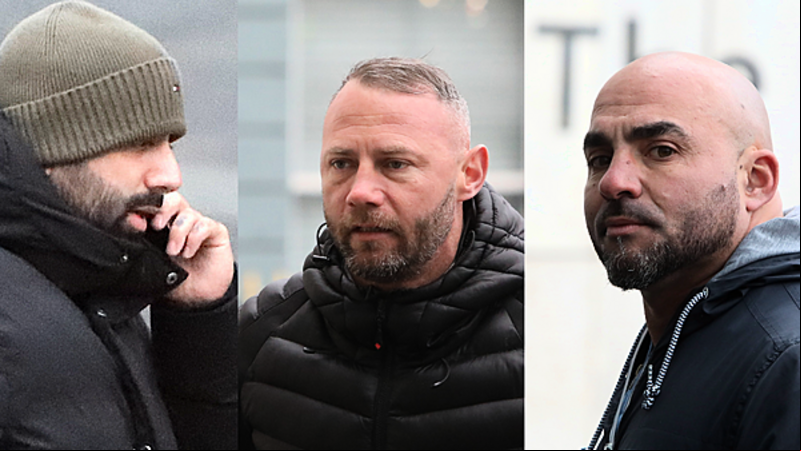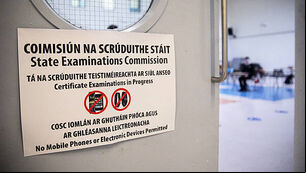Three convicted of rape and sex assault of woman they met in Dublin nightclub

Eimear Dodd
Three men have been convicted of the rape and sexual assault of a woman they met in a Dublin nightclub almost six years ago.
The three men had pleaded not guilty to a total of seven counts of rape, oral rape and sexual assault of the woman at an unknown location in a car and in a Dublin house on August 31st, 2019.
The jury of eight men and four women returned guilty verdicts on Wednesday on six of the seven charges after a total of 13 hours of deliberation.
Anthony Hickey (39), of Ballyogan Square, Carrickmines, Dublin 18, was convicted of rape, oral rape and sexual assault by a majority verdict.

Hickey had pleaded not guilty to one count of raping the woman in his then-home address in Ballyogan and not guilty to one count of oral rape and one count of sexually assaulting her in a car.

Fabio Vicente (42), with an address at Little Newtown, Enniskerry, Co Wicklow, was convicted of two counts of rape by a majority verdict of the jury. He had pleaded not guilty to one count of raping the woman in the car and one count of raping her in the house.
Matin Zolfaghari (34), of Marley Court, Rathfarnham, Co Dublin, was convicted of oral rape by a majority verdict, and acquitted of sexual assault. He had pleaded not guilty to orally raping the woman in the house and sexually assaulting her in the car.
The men made no visible reaction while the registrar read out the verdicts.
Mr Justice Paul Burns thanked jurors for their care and attention to this “particularly difficult case”.
The complainant was present in court when the verdicts were read out.
The judge said the men’s status had changed following their convictions. Remanding the three men in custody, he adjourned the case until March 10th for sentence and directed the preparation of a victim impact statement.
After the court rose, the three men appeared shocked, then hugged family before they were taken into custody.
Trial evidence
Giving evidence from behind plastic screens attached to the side of the witness box, the woman said she and her housemate went for some drinks before going to the nightclub in the early hours of August 31st, 2019.
She said they were dancing and she had "silly chat" with a group of men, possibly three or four.
Her housemate told her she was leaving and the woman said she’d follow her home.
She told Karl Finnegan SC, prosecuting, that things started to become “ faded and hazy” after her housemate left. “I believe I was drugged”.
She recalled a “bag of white powder in the vicinity”, but couldn't if she took any.
Her first recollection after leaving the nightclub was sitting in the back of a vehicle, which she thought was a taxi. A man was sitting with her and three others were also in the car.
Her memory of this time was “hazy” but “I a male being on top of me”.
She said she was raped twice in the car, but couldn't say if it was by the same person.
The car stopped and she recalled the taxi driver “playing with his zipper then there's nothing else from me until the house”.
Her next memory was of lying on a bed, with two others in the room, one of whom was on top of her.
She said she tried to kick out her leg, but “wasn’t going to be able to fight”.
She ed out and a man, identified as Hickey during the trial, was asleep beside her when she woke the next morning.
She said she rushed from the house and got a taxi home where she told her housemate what had happened.
Counsel for each man put their clients' version of events to her during cross-examination, outlining a series of allegedly consensual sexual activities in Vicente’s SUV and later, in Hickey’s then home.
She appeared emotional at times while these s were put to her, often replying that she had memory gaps from the night. She remained firm that she hadn’t consented to any sexual acts with the men.
At one point, she said the three men “were strangers to me then, they are strangers to me now.”
She was shown a compilation of CCTV from the nightclub, the streets outside the venue and the route taken by the SUV.
The victim disagreed with defence counsel that she didn’t appear highly intoxicated in the footage.
When asked if she recalled any physical violence by Hickey, the woman said she didn’t, adding “I think rape is violence”.
The defence case
In separate voluntary interviews with gardaí on September 10th, 2020, the men offered similar s of events in the early hours of August 31st, 2019.
They each said the woman consented to sexual activity, except for a request by the first man for anal sex. They each told gardaí that the woman didn’t withdraw consent or appear too intoxicated to give consent.
The three men said they were in a nightclub where they met the woman. They told gardaí the four of them went to the SUV, intending to find an afterparty.
Vicente initially drove to Zolfaghari’s home. While he went inside, Hickey and Vicente remained in the car with the woman.
Hickey said he and the woman kissed.
When Zolfaghari returned, they drove away from his home.
Vicente said at some point, Hickey asked her when was she going to have the chance to have sex with “three good-looking guys” “who are comfortable together”. Vicente said Hickey told her “no one will know” and she agreed.
Hickey and the woman then kissed.
The SUV pulled over, then Hickey performed oral sex on the woman. She then kissed Zolfaghari.
Vicente got into the back, kissed the woman, then had sex with her.
Hickey said the woman performed oral sex on him while having sex with Vicente.
They said the woman went with them to Hickey’s then residence. In his bedroom, she had sex with Vicente. She also kissed Hickey, then performed oral sex on him.
She then had sex with Hickey and also performed oral sex on Zolfaghari.
Vicente and Zolfaghari left in the early hours.
Hickey said the woman asked to stay and they slept in the same bed. He said he walked her to his front door the next morning and saw her get into a taxi.
He told gardaí that he “thought it was a normal night”. “What she is saying happened is wrong”, later describing it as “100 per cent not true”.
Vicente described the woman as being “in control”. He said he was “a bit lost” about the allegations, adding “I know I would never do that”.
Zolfaghari denied performing oral sex on the woman in the car. He said he had kissed the woman in the car and she later performed oral sex on him in the house. He said the woman was “having fun” and didn't withdraw consent at any point.
Video clips
An analysis of Hickey’s phone found WhatsApp messages between him and Zolfaghari. On September 9th, 2019, he wrote “send me that clip of your one”.
Zolfaghari replied “which one”, to which Hickey responded with the name of the nightclub.
Two video clips were sent by Zolfaghari, with Hickey replying “listen to you laughing after she says no”.
The clips were recorded by Zolfaghari. A female voice says 'no' several times during a 30-second clip, recorded in the SUV. An investigating garda said he believed a male voice says “stick it up her arse” in this clip.
No words are audible in a six-second clip, which was recorded in the house. The videos were not recovered during analysis of Vicente’s phone.
When asked during interview, the three defendants told gardai the woman was refusing Hickey’s request for anal sex in the 30-second clip. There are no allegations of anal rape against any of the accused men in this case.
Zolfaghari said he recorded the videos as it was his “first time experiencing something like this” and that they record consensual sexual activity.
He said he shared the videos “for a laugh”, describing it as a “locker room chat” between “blokes.”
In his garda interviews, Hickey described this exchange as “boys being boys [which] might come across crude”.
Vicente also suggested to gardaí that the woman was saying ‘no’ to a request to remove her top.
When gardaí put to him that these videos record him and the other accused raping the woman, he said “she was never forced, [she] was never raped.”
Other evidence
Approximately 160 hours of CCTV footage was reviewed by gardaí during the investigation, which was used to identify the three men and the vehicle, a Volkswagen SUV.
The court heard no evidence was found on the nightclub’s CCTV of the woman taking or being offered a white powder or of the men handing her a drink.
Evidence was heard bruises and red marks were found on the woman’s arms and legs during an SATU examination.
DNA profiles matching Hickey and Zolfaghari were identified during an analysis of saliva found on the inside of the woman’s bra and underwear. A third trace contribution was also identified, which could not be interpreted due to insufficient information.
The forensic examiner said male DNA was found on a number of other samples, but was insufficient to create a profile. Seminal fluid was also identified on some swabs.
She said Vicente’s DNA was excluded from all interpretable portions of DNA.
The witness accepted a general suggestion from Seamus Clarke SC, for Zolfaghari, about the secondary transfer of DNA onto clothing, noting that this will depend several factors.
The witness said she would have a “lower expectation” of finding saliva and DNA on the inside of a bra if a top was not removed, “if the clothing is never removed, that’s unlikely”.
The jury also heard evidence that the woman’s blood-alcohol range at the possible time of the incident was 210mg/100ml to 375mg/100ml and the possible effects of alcohol consumption in this range.
A urine sample from the woman was analysed to check for 43 different drugs with only cocaine detected.
‘We got to war’
In the absence of the jury, the prosecution sought to introduce a series of WhatsApp messages recovered from Vicente’s phone.
This phone was seized after he suggested in garda interviews that there was a third video, but no other recordings were found.
The court heard that Hickey had messaged Vicente with an of the night in question on January 16th, 2020.
This wasn’t read to the court, but was described during legal argument as a collective .
Hickey then wrote “read and see what you think”, then later asked if an email had been sent.
A screenshot of this was also sent by Zolfaghari to Vicente on a later date.
In a message dated July 30th, 2020, Hickey forwarded an article to Vicente about the quashing of a rape conviction saying “read this” and “can you talk”.
On September 8th, 2020 – two days before their garda interviews – Hickey messaged Vicente with the , asking him to read it. Hickey said he had been going over it “to stay sharp” and that they should “meet tomorrow before we go to war” .
The defence initially sought to exclude these messages on the grounds of relevance and potential prejudice. It was later argued that the of the night was legally privileged as it arose from legal advice provided to the men by their solicitor.
An email of this sent by Vicente on January 17th, 2020, to their solicitor was handed into the court.
The men’s solicitor told the court he recalled holding a preliminary consultation in December 2019 during which he suggested they “should individually work on their memory” and if necessary, to speak with each other about that night to refresh their memories.
Karl Finnegan SC, prosecuting, argued that this case is “about the credibility of witnesses” and the exclusion of these messages would leave the jury without “very relevant evidence” when they are considering the reliability of the men’s s.
No ruling was made by Mr Justice Paul Burns as an agreement was reached by the parties. Instead, the jury heard that the men messaged each other before their garda interviews, arranging to meet.
Closing speeches
Prosecuting senior counsel Mr Finnegan told the jury the “central” issue in this case is consent.
He said the woman's evidence was “dignified and credible” and she was “clear” that she didn't give consent.
He submitted that the men didn't know what the woman ed “so they had to go the whole hog” on the issue of consent when interviewed by gardaí. “They paint [her] as the driving force, the one in control”.
Mr Finnegan suggested to the jury that consent is a “concoction”, and that the men took advantage of the woman.
Mr Dwyer asked the jury to assess the woman's evidence against other material in the case and suggested she didn't appear highly intoxicated and was capable of giving consent.
“We're not saying she is a calculating liar, but her word is not reliable,” he said.
Garret Baker SC, for Vicente, suggested the quality of the evidence in the case “is not sufficient to ground a criminal conviction”.
He told the jury an acquittal is not a condemnation of the woman but a “simple recognition” that the evidence “does not go far enough”.
In his closing speech, Mr Clarke described his client, Zolfaghari, as predominantly “a bystander“ to sexual acts engaged in by others.
Mr Clarke said the fact that Zolfaghari recorded two clips while others engaged in sexual acts “does him no favours”, but doesn’t mean his client committed the alleged offences.
He said Zolfaghari denies performing oral sex on the woman in the SUV and asked the jury to consider if there were other explanations for how his client’s DNA may have transferred onto the woman’s clothing.









